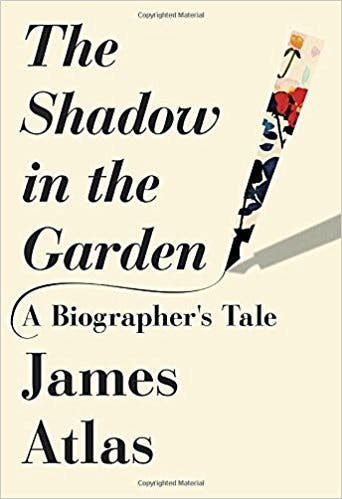In 1987, Saul Bellow gave an interview about the controversial book The Closing of the American Mind by his friend Allan Bloom. During the conversation, Bellow delivered a now-infamous line that was widely read as a flippant profession of cultural imperialism: “Who is the Tolstoy of the Zulus, the Proust of the Papuans?” It became exhibit A in the case against Bellow, who had seemed to disregard the cultural output of all nonwhite peoples with a flip of his hand. But according to him, he never said it. In a New York Times op-ed, he wrote: “Nowhere in print, under my name, is there a single reference to Papuans or Zulus. The scandal is entirely journalistic in origin, the result of a misunderstanding that occurred (they always do occur) during an interview. I can’t remember who the interviewer was.”

The interviewer was James Atlas. At the time of the interview, he was the author of a celebrated biography of Delmore Schwartz, and he would go on to write a notorious biography of Bellow, as well as to preside over the Penguin Lives biography series as founding editor, exercising an unparalleled influence upon the recent course of American literary biography.
Now, Atlas has written about himself. In his memoir The Shadow in the Garden, he writes: “I have come across the notebook in which I scrawled this now-famous (or infamous) line, and it turns out that the word Bellow used was ‘Polynesians.’” Atlas’s confession falls short of Bellow’s protestation, and everything that makes the memoir intriguing and uncomfortable is present in this spat. The Shadow in the Garden — a memoir of Atlas’s work as a biographer, interspersed with reflections on the history of the art — explores the dark side of life writing: the tradeoffs between vividness and accuracy, the struggle with feelings of invisibility and inferiority, the difficulty of retaining sympathy for a person about whom you know too much, and the rancor that can arise between a biographer and his subject.
The first book Atlas wrote, Delmore Schwartz: The Life of an American Poet, was a critical triumph. Contracted to write it when he was just 25, he used techniques learned from Richard Holmes and Richard Ellmann to produce a biography that read like a novel. The method which produces such vivid life writing is something Atlas calls “empathic observation.” It involves a bit of imagination and a lot of copious, meticulous research to characterize life events as if from within. Voice, dramatized dialogue, atmospheric scene setting—these are techniques that can make a biography vivid and memorable. But getting them right depends upon prodigious feats of detail-mongering. To begin a chapter by evoking the specific weather of a historical day, for example, means sleuthing “through almanacs, old newspapers, and nautical records.” Atlas writes:
You can’t know what your subject felt. But you can get close. Going deeper into his subject through the artful deployment of his materials, the biographer inhabits his subject’s life as if he had been there — as if the events he’s relating hadn’t occurred in the distant past but had just happened.
Atlas thinks he came close to knowing what his subject felt in the years he spent investigating the poet Delmore Schwartz. It may have worked out because of a great personal affinity that Atlas discovered between himself and his subject. Schwartz suffered from bipolar disorder: his life was a tragic story of immense promise unfulfilled. Later, Atlas was diagnosed with the same illness. Perhaps the preconditions for successful empathic observation are not merely to be struck by interest, but to see one’s self in the subject.
Atlas’s research led him to make the acquaintance of an aging generation of New York intellectuals, many of whom had centered their careers around the now-defunct Partisan Review. One of them, Dwight Macdonald, became Atlas’s mentor and informal editor. Through Macdonald, Atlas got a taste of the combative discourse of the 1940s that had shaped Schwartz’s intellectual life. “The manuscript had a battle-scarred look,” he wrote of receiving his draft back from Macdonald. “There were singed holes where smoldering cigarette ash had been scattered over the page, and one chapter, edited from the hospital bed where Dwight was recovering from an operation, arrived in the mail wrapped in gauze, the pages smeared with blood — visible evidence of the surgery he was performing on my sickly prose.” Atlas also became friends with the critics Alfred Kazin and Philip Rahv, and eventually he made the acquaintance of the most famous figure associated with the New York intellectuals, Saul Bellow.
There was something fateful about meeting Bellow. The novelist had known Delmore Scwhartz, and was, in fact, writing a fictionalization of the poet’s life when Atlas first came to interview him. The resulting book, Humboldt’s Gift, probably contributed to the success of Atlas’s biography of Schwartz, and Atlas believes that one passage is actually about him:
I was alarmed when I encountered a passage [in Humboldt’s Gift] about young scholars “fabricating cultural rainbow textiles” out of the 1940s. “Young people, what do you aim to do with the facts about Humboldt,” asks Charlie Citrine. “Publish articles and further your careers?” It was a relief when he moved on to a rumination about Humboldt. A satirical aside was one thing; a whole portrait I didn’t need.
Perhaps this encounter should have warned Atlas off, but he grew increasingly fascinated with Bellow. He decided to become Bellow’s authorized biographer, if he could. He was never authorized, but he wrote a biography anyway. It was Atlas’s second biography, and it made as dramatic a splash as his first, but this time to a chorus of critical condemnation.
Over the years it took Atlas to research the book, his relationship with Bellow grew increasingly rancorous. Bellow was distrustful of Atlas in part because the idea of a biography reminded him distressingly of his own death—it was, he said, “the shadow of the tombstone in the garden.” Bellow insisted upon signing off on each quotation. This struggle was complicated by how much Atlas admired Bellow. “I had wanted to be a son to him,” writes Atlas, “only to discover the spot was taken by several others.”
Writing a biography, he found, could be emotionally complicated. Immersing himself in the details of another person’s life led inevitably to self-comparison. But comparing himself to a celebrated novelist like Bellow was much less flattering than comparing himself to a forgotten poet like Schwartz. The process engendered envy and self-doubt:
“Most of the time I didn’t mind our unequal stature and talents: Go, you be the genius. But sometimes I felt: What about my life? Doesn’t it count, too? There comes, inevitably, a moment of rebellion, when the inequality begins to chafe. Biographers are people, too, even if we’re condemned to huddle in the shadow of our subjects’ monumentality. ... A thousand pages along, a decade in, the biographer cries out: What am I? Chopped liver? Yes. That’s what you signed on to be, and that’s what you are. Deal with it.”
The envy may have turned into resentment, and the resentment may have infected his prose. When his book was finally published in 2000, critics almost universally perceived it as an act of enmity against its subject. As late as 2015, when a new biography of Bellow appeared, this perception continued to cloud the reputation of Atlas’s book. In a review of that new biography for the New York Times, Dwight Garner wrote that Bellow had “lost faith in Mr. Atlas and stopped co-operating with him before the book was published.” But, Atlas protests, “whether he’d lost faith in me or not, he co-operated right up to the end.” It’s not the only one of these corrections that he issues. The Shadow in the Garden is at least partially a defense of Atlas’s honor in response to the harsh reception of this earlier book.
What saves the memoir is the self-awareness with which Atlas presents his personal experience. At times he is less defensive than apologetic, eager to get it right. He describes how the reception of his biography of Bellow caused him to worry obsessively about whether he had been unfair or malicious:
One day I sat down with yellow Post-its and went through my book page by page, marking the places where I felt I had gotten it wrong — not in fact but in tone, a thing much harder to get right. I referred to these as the Twelve Errors. ... Some were ungenerous assertions: ‘Bellow wasn’t a nurturing person — to students, children, wives, or parents. He wanted the nurturing.’ Others were snotty: ‘Writers who posed a threat to Bellow’s hegemony got the cold shoulder.’ A few were judgmental, the worst sin of all: ‘In Bellow’s self-serving and sanctimonious account…’ How I longed to edit these sentences.
Over the years, Atlas would take down his book again and consider each Post-it, occasionally discarding one that, on reflection, did not seem to embody an error. Eventually he had an epiphany:
The key to writing biography is the capacity to be empathic; Holmes’s image of the biographer extending “a handshake” toward his subject stayed with me. At some point, without realizing it, I had withdrawn my hand.
Atlas chooses to join the chorus of condemnation against his own book; not on grounds of inaccuracy, but on grounds of unkindness. He claims to have fallen short of his own standards of empathic observation. The reader, however, is hard pressed to sympathize with the idea that he did not understand Bellow. Instead, it seems like Atlas got far too close.
The memoir is divided between the light and the darkness of biography, illustrated by the empathic triumph of his first book and the empathic failure of his second. He contextualizes both experiences by interweaving discussions of the history of literary biography. Atlas discusses J.A. Froude, whose biography of Thomas Carlyle also acquired a reputation for hostility, and Elizabeth Gaskell, whose biography of Charlotte Brontë was attacked on every side by figures from Brontë’s life who disliked how they were portrayed in it. The suggestion is that The Shadow in the Garden is written on behalf of all the biographers whose honesty about their subjects was interpreted as gossip, or whose readability was maligned as salaciousness. Such are the pitfalls of the genre. But is biography writing worth it? Atlas thinks it is:
The challenge of reconstructing someone else’s world; the opportunity to educate yourself; the serendipitous encounters and unlikely finds, I found this invigorating. You could never hope to get it right. ... But if, over many years, you worked very hard and extended your hand, you could write a book that earned a high degree of permanence.
